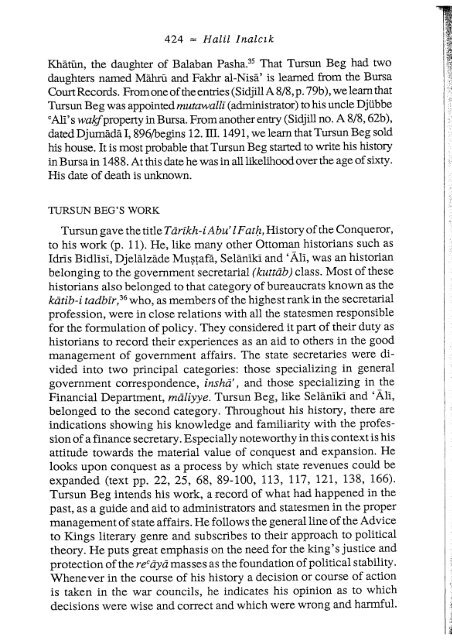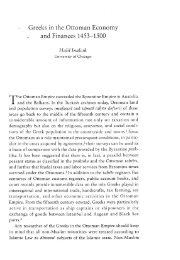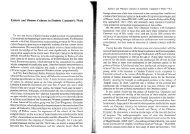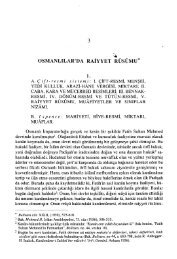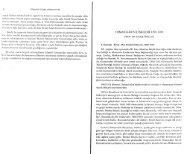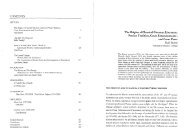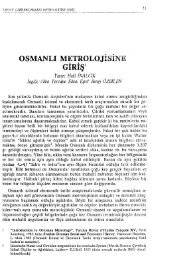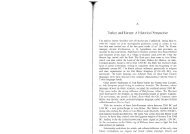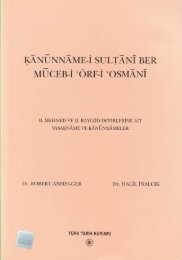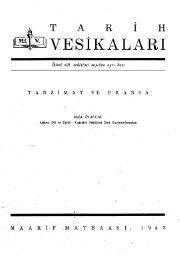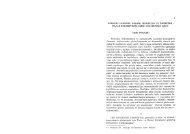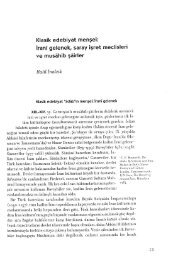Tbrsun B.g, Historian of Mehmed the Conqueror's Time
Tbrsun B.g, Historian of Mehmed the Conqueror's Time
Tbrsun B.g, Historian of Mehmed the Conqueror's Time
You also want an ePaper? Increase the reach of your titles
YUMPU automatically turns print PDFs into web optimized ePapers that Google loves.
424 = Halil Inalctk<br />
Khatun, <strong>the</strong> daughter <strong>of</strong> Balaban Pasha.3s That Tursun Beg had trvo<br />
daughters named Mahru and Faktr al-Nisa' is leamed from <strong>the</strong> Bursa<br />
Court Records. From one <strong>of</strong> <strong>the</strong> entries (Sidjill A 8/8, p. 7 gb),we learn that<br />
Tursun Beg was appointed mutawalli (administrator) to his uncle Djiibbe<br />
"Ah's walgf propefiy in Bursa. From ano<strong>the</strong>r entry (Sidjill no. A 8/8,62b),<br />
dated Djumada I, 896/begins 12. m. I49l,we learn that Tursun Beg sold<br />
his house. It is most probable that Trnsun Beg started to write his history<br />
in Bursa in 1488. At this date he was in all likelihood over <strong>the</strong> age <strong>of</strong> sixty.<br />
His date <strong>of</strong> death is unknown.<br />
TURSTIN BEG'S WORK<br />
Tursun gave <strong>the</strong> title Tarlkh-i Abu' I Fath,History <strong>of</strong> <strong>the</strong> Conqueror,<br />
to his work (p. 11). He, like many o<strong>the</strong>r Ottoman historians such as<br />
Idris Bid.lisi, Djelalzade Muqlafh, Selanikr and'Ali, was an historian<br />
belonging to <strong>the</strong> government secretarial (kuttab) class. Most <strong>of</strong> <strong>the</strong>se<br />
historians also belonged to that category <strong>of</strong> bureaucrats known as <strong>the</strong><br />
katib-i tadbIr,36 who, as members <strong>of</strong> <strong>the</strong> highestrankin <strong>the</strong> secretarial<br />
pr<strong>of</strong>ession, were in close relations with all <strong>the</strong> statesmen responsible<br />
for <strong>the</strong> formulation <strong>of</strong> policy. They considered it part <strong>of</strong> <strong>the</strong>ir duty as<br />
historians to record <strong>the</strong>ir experiences as an aid to o<strong>the</strong>rs in <strong>the</strong> good<br />
management <strong>of</strong> government affairs. The state secretaries were divided<br />
into two principal categories: those specializing in general<br />
government colTespondence, insha' , and those specializing in <strong>the</strong><br />
Financial Department, maliyye. Tursun B"g, like Sellnikr and 'Ah,<br />
belonged to <strong>the</strong> second category. Throughout his history, <strong>the</strong>re are<br />
indications showing his knowledge and familiarity with <strong>the</strong> pr<strong>of</strong>ession<br />
<strong>of</strong> a finance secretary. Especially noteworthy in this context is his<br />
attitude towards <strong>the</strong> material value <strong>of</strong> conquest and expansion. He<br />
looks upon conquest as a process by which state revenues could be<br />
expanded (text pp. 22,25, 68,89-100, 113, lt7, lzl, 138, 166).<br />
Tursun Beg intends his work, a.record <strong>of</strong> what had happened in <strong>the</strong><br />
past, as a guide and aid to administrators and statesmen in <strong>the</strong> proper<br />
management <strong>of</strong> state affairs. He follows <strong>the</strong> general line <strong>of</strong> <strong>the</strong> Advice<br />
to Kings literary geme and subscribes to <strong>the</strong>ir approach to political<br />
<strong>the</strong>ory. He puts gleat emphasis on <strong>the</strong> need for <strong>the</strong> king's justice and<br />
protection <strong>of</strong> <strong>the</strong> re"ayamasses as <strong>the</strong> foundation <strong>of</strong> political stability.<br />
Whenever in <strong>the</strong> course <strong>of</strong> his history a decision or course <strong>of</strong> action<br />
is taken in <strong>the</strong> war councils, he indicates his opinion as to which<br />
decisions were wise and correct and which were wrong and harmful.<br />
Ttrrsun Beg, <strong>Historian</strong> <strong>of</strong> <strong>Mehmed</strong> <strong>the</strong> <strong>Conqueror's</strong> <strong>Time</strong> = 425<br />
There is one main <strong>the</strong>me which runs throughout Tursun's history:<br />
<strong>the</strong> concept that <strong>the</strong> good order <strong>of</strong> state and society is inextricably<br />
bound to <strong>the</strong> being <strong>of</strong> <strong>the</strong> one Sultan. At <strong>the</strong> time <strong>of</strong> <strong>the</strong> history's<br />
writing, everyone in ottoman society was under <strong>the</strong> influence <strong>of</strong> <strong>the</strong><br />
destructive effects <strong>of</strong> <strong>the</strong> civil war which had broken out after<br />
<strong>Mehmed</strong> II's death. The fear that Sultan Djem, at that time in refuge<br />
in Europe, would return to claim <strong>the</strong> throne and that civil war would<br />
again blaze out was universal (see especially text pp. 7 -3L, 17 5-84,<br />
198). Sharing this feeling with all those who were concerned with <strong>the</strong><br />
well-being <strong>of</strong> <strong>the</strong> Ottoman state, Tursun desjred that BayezTd be<br />
firmly established on <strong>the</strong> throne, and in his history he wanted to<br />
emphasize this point. The long introduction (pp. 1 1-3 1) was cerrainly<br />
written for that pulpose.<br />
At <strong>the</strong> same time, Tursun did not neglect to express his awareness<br />
that it was through <strong>the</strong> conquests <strong>of</strong> <strong>Mehmed</strong> tr that <strong>the</strong> Ottoman state<br />
had become <strong>the</strong> most powerful and respected state in <strong>the</strong> Islamic<br />
world. Bayezid II wanted an Ottoman history composed that would<br />
show <strong>the</strong> superiority <strong>of</strong> <strong>the</strong> Ottoman House to o<strong>the</strong>r rival Islamic<br />
dynasties in Iran and Egypt.37 During just <strong>the</strong> period in which Tursun<br />
was writing his history, a violent conflict broke out between <strong>the</strong><br />
Ottomans and <strong>the</strong> Mamluks, who backed and supported Djem Sultan<br />
and <strong>the</strong> Karamanid House in defiance <strong>of</strong> Bayezid II. It is likely that it<br />
was within <strong>the</strong> ambience <strong>of</strong> Ottoman-Mamlukrivalry that Tursun Beg<br />
conceived <strong>the</strong> idea <strong>of</strong> writing a history <strong>of</strong> <strong>Mehmed</strong>'s reign, with which<br />
he was so intimately familiar, and <strong>of</strong> presenting it to <strong>the</strong> new Sultan<br />
Blyezid. Tursun gives open expression to his anti-Mamluk feelings<br />
in his history.38<br />
Tursun also makes reference in his introduction (text pp. 9-10) to<br />
<strong>the</strong> fact that he considered it a debt <strong>of</strong> gratitude to <strong>the</strong> late Sultan<br />
<strong>Mehmed</strong>, for his generosity towards him, to compose a history <strong>of</strong> his<br />
reign. However, it is made clear that at <strong>the</strong> same time he expected<br />
some reward from Bayezid II for <strong>the</strong> writing <strong>of</strong> his history. In <strong>the</strong><br />
appropriate places throughout <strong>the</strong> text he refers to his poverty and to<br />
Sultan Bayezid's generosity (text pp. 8, 22, I25,I59, I79). Tursun<br />
also states that his purpose in writing <strong>the</strong> history <strong>of</strong> <strong>Mehmed</strong>'s reign<br />
was to form <strong>the</strong> foundations for <strong>the</strong> history <strong>of</strong> <strong>Mehmed</strong>'s young<br />
successor (text p. 17 9) . In fact, in <strong>the</strong> T arlkh-i Abu' I F athitself Tursun<br />
Beg covers <strong>the</strong> events <strong>of</strong> Bayezid's reign up to <strong>the</strong> year 1488. He also<br />
gave expression to his intention to continue his history should his own<br />
longevity permit (text p. 198).


